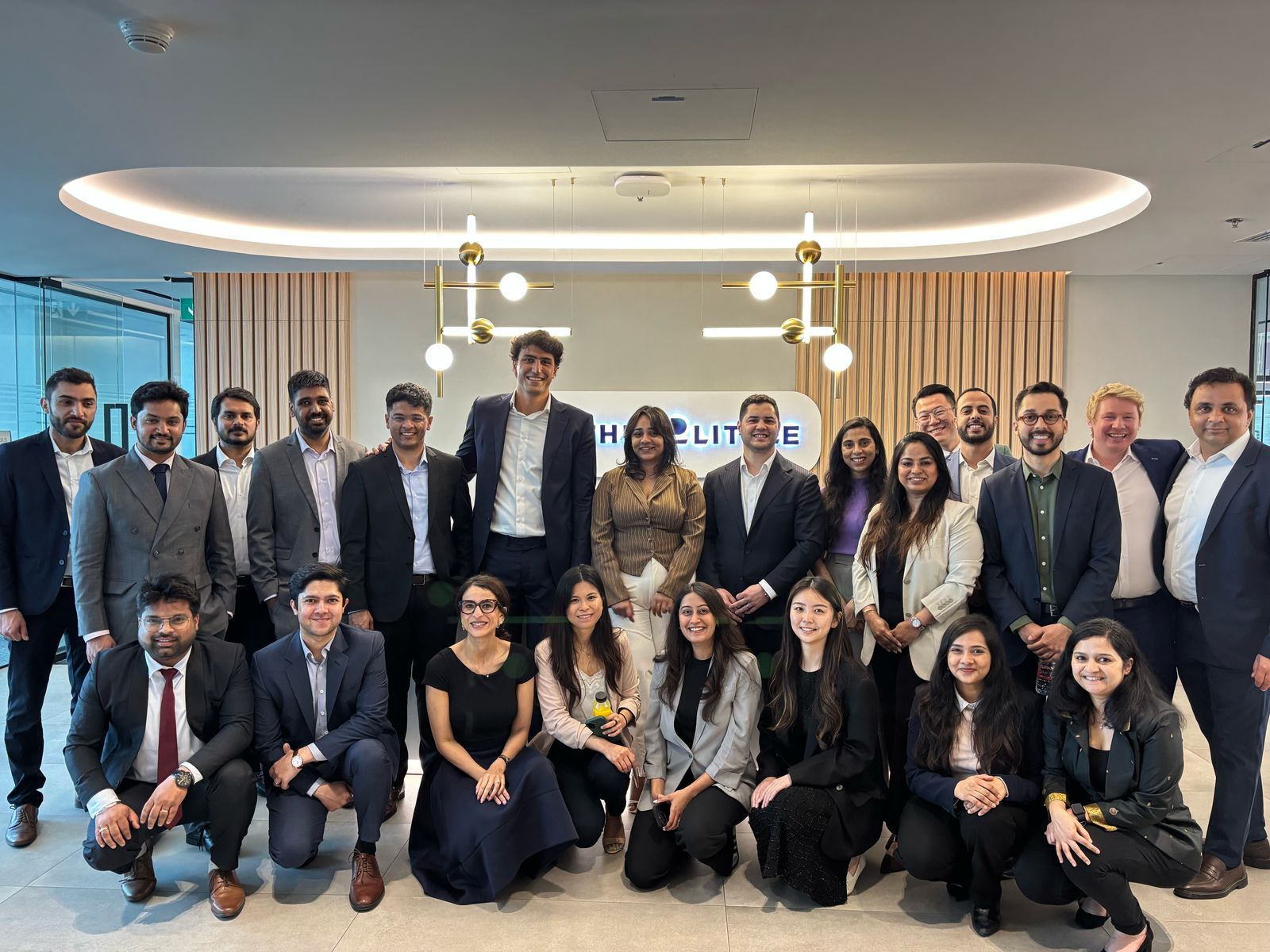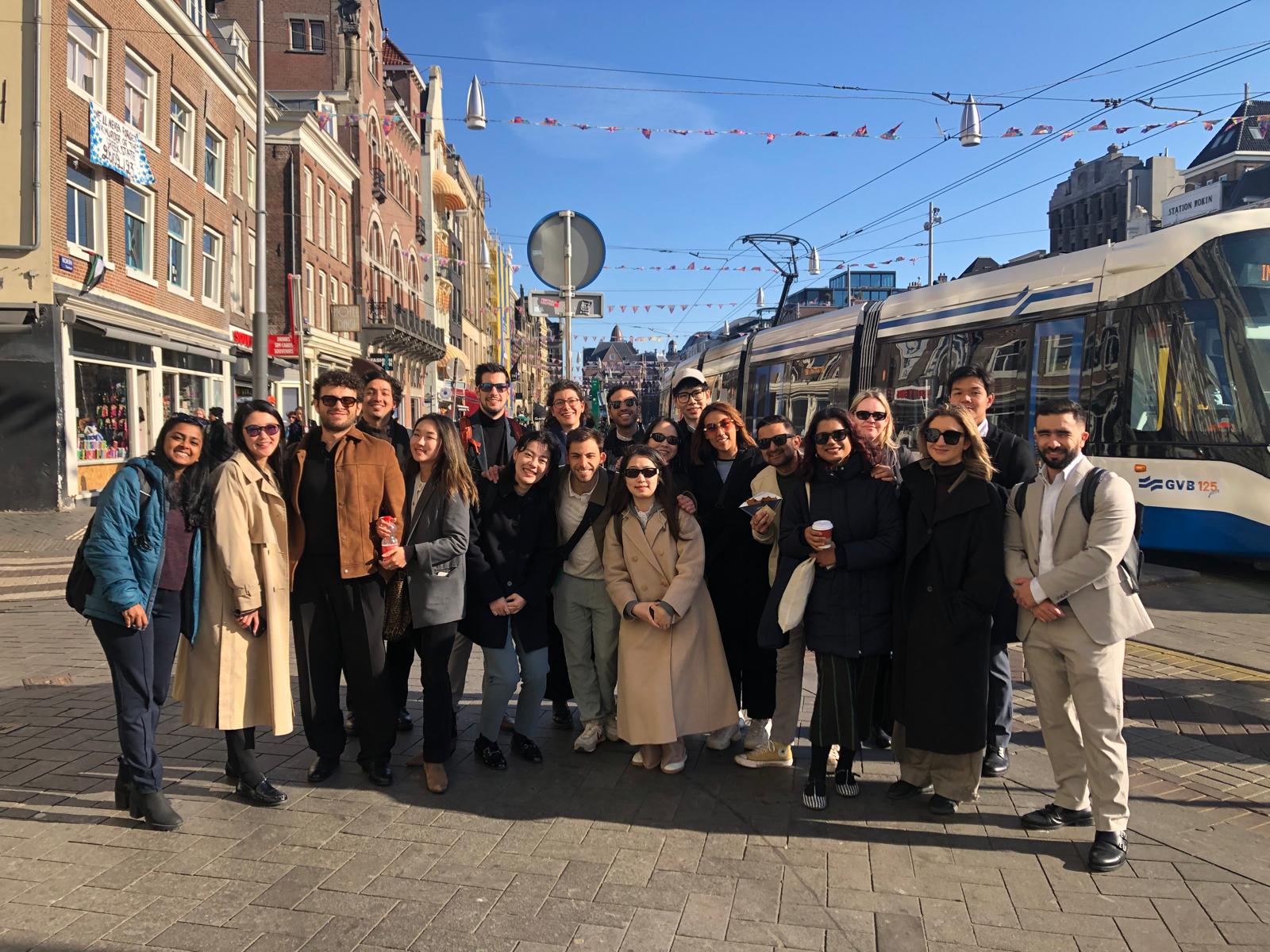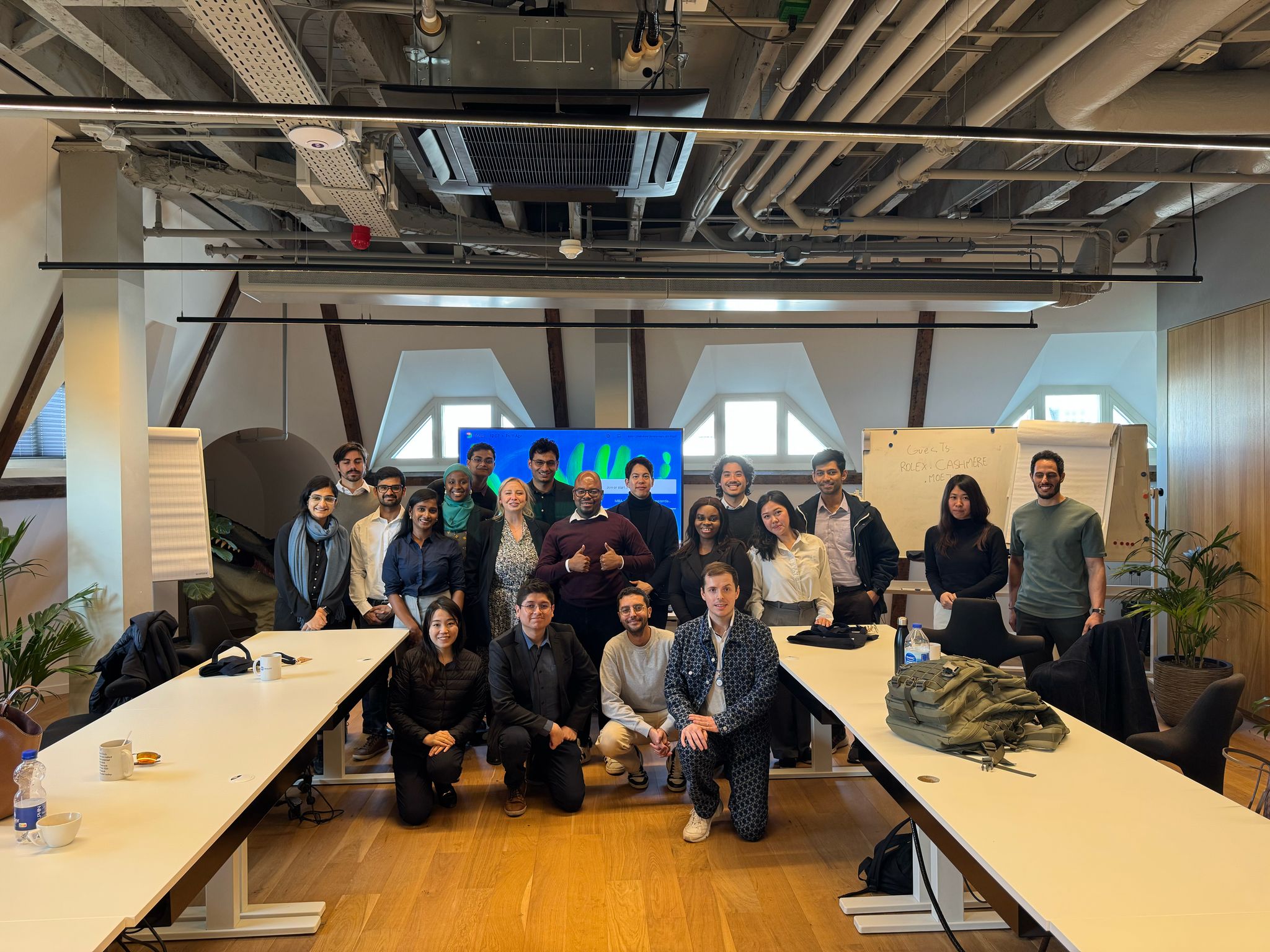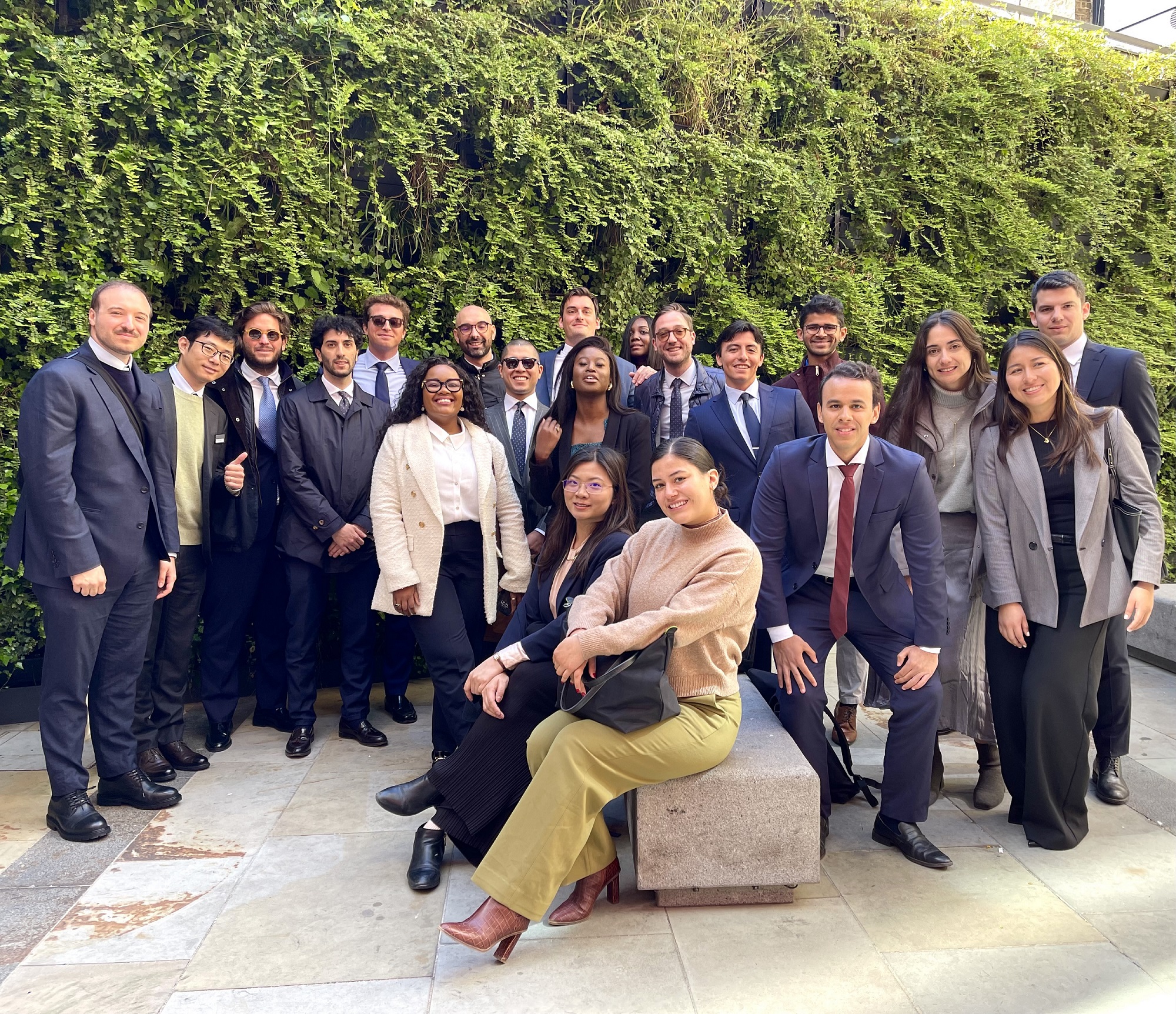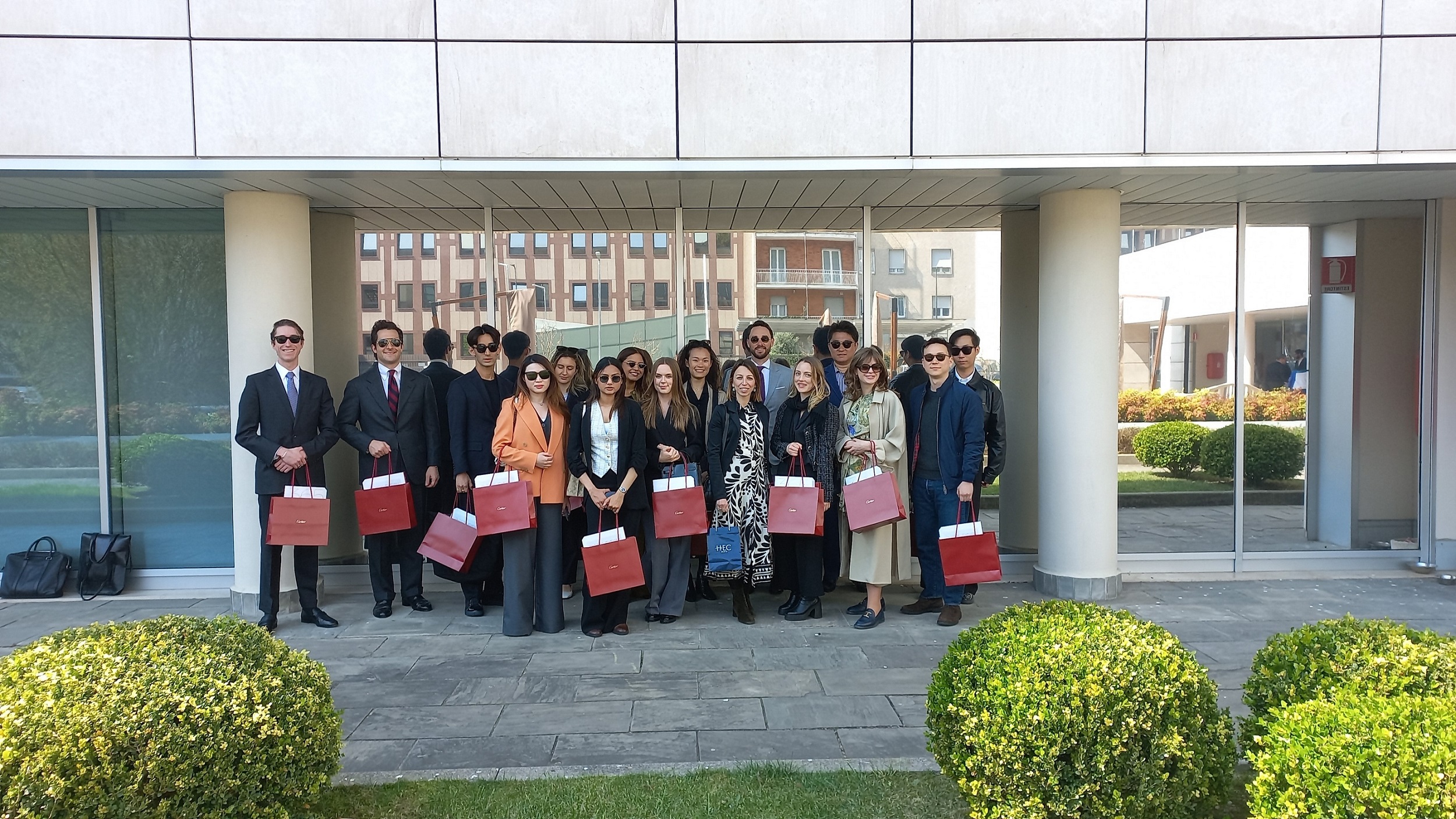MBA Connections: Treks Edition
At the start of spring, HEC MBA students set off on one of the most impactful events of the year. Organized by HEC Talents, our career center, in partnership with participant-led professional clubs, Treks allow students to visit businesses and learn more about how they run, while making connections with both peers and industry leaders.
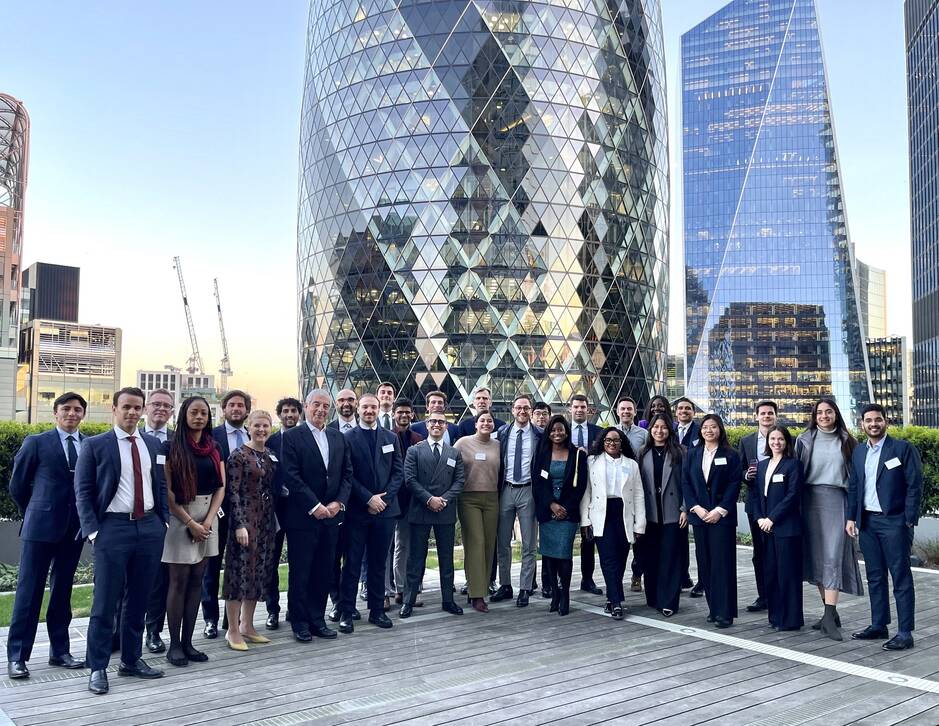
A mix of September ’24 and January ’24 and ’25 cohorts, the Treks were a welcome opportunity for participants to get to know each other.
Treks allow MBA participants to get a feel for the region they are visiting and to get insights about living there from hosting companies. During company visits, they met founders, CEOs and senior partners who were very candid as they shared their personal experiences.
This year, Amsterdam was a hub for club activity, with the Tech Club and Product Management Club going on a joint trek, as well as a second joint trek consisting of the FMCG (Fast-Moving Consumer Goods) Club, Marketing Club, Industry Club and Sustainability Club. HEC Talents also worked with MBA participants to coordinate exciting Treks in London for the Finance Club, Milan for the Luxury Club and Dubai for Consulting Club. This year, 38 companies hosted HEC Paris MBA participants.
We caught up with club leaders upon their return to campus to hear more about their experiences.
Club: Consulting Club
Trek destination: Dubai, UAE
Companies visited: Caliber Consulting, Property Finder, DXC Technology, Whiteshield, EY-Parthenon, Arthur D. Little, Roland Berger, Kearney, Syska Hennessy Group.
PARTICIPANT REFLECTIONS - Márcio Machado, Co-president, Consulting Club
What was the highlight of the trek for your club?
The highlight of the trek was certainly meeting the incredible professionals who are actively shaping business in the region. Hearing how they’ve built their careers, adapted to local dynamics, and approached transformation in the Middle East was inspiring. A special moment was the alumni mixer, where we had the chance to connect with HEC graduates now working across various industries in Dubai. It was great to see how the HEC network is thriving and how willing alumni were to share their insights and experiences.
Why do you think Treks are an important part of the HEC experience?
Treks help us go beyond theory and see how industries actually work on the ground. They give us a chance to understand the business landscape of different regions, build meaningful connections, and experience things firsthand - perspectives we simply can’t get from a classroom. It’s an opportunity to ask questions, see real challenges being solved, and start thinking more critically about where we want to go next in our careers.
Personal to you: Did anything about the Trek open your eyes to something unique about your industry and how has that information made you better equipped to position yourself in your career?
Coming from the consulting industry in Brazil, it was fascinating for me to see how the same profession can take on a very different shape depending on the regional context. In the Middle East, consulting is deeply intertwined with national development, infrastructure, and public policy. The scale and impact of the projects are often massive. That contrast helped me reflect on how adaptable consultants need to be, and how important it is to understand the social and economic realities of the places we work in. It’s definitely broadened my perspective and given me new angles to think about as I plan the next steps in my career.
Clubs: FMCG Club, Marketing Club, Industry, Sustainability Club
Trek destination: Amsterdam, Netherlands
Companies visited: Air Products, Nexio Projects, Fashion For Good, Cartier (Richemont), ACT Group, Kraft Heinz, The Startup Village, Picnic. After the company visits we finished the trek with a social event with HEC Alumni from Amsterdam at The Social Hub.
PARTICIPANT REFLECTIONS - Alonso Benguria, VP of Events, Sustainability Club
What was the highlight of the trek for your club?
Sustainability is not just a standalone industry, it's a way of doing business and an integral part of strategy. While it's often easier to see sustainable practices in industries like energy transition or climate tech, it can be more challenging to visualize their role in sectors such as finance, FMCG, or Industry. One of the highlights of this multi-sector trek was that it gave participants a comprehensive view of how different business sectors are integrating sustainability today, as well as the key challenges they face for the future. The speakers at each company did an excellent job of illustrating this.
“One of the key benefits of the trek is that it allows students to make connections between what we’ve been learning on campus and what’s happening in companies.”
Why do you think Treks are an important part of the HEC experience?
The first terms of the MBA give you a lot of business foundations through cases, presentations, practical exercises, and more. One of the key benefits of the trek is that it allows students to make connections between what we’ve been learning on campus and what’s happening in companies. We got to hear firsthand how companies approach their marketing and branding, the pricing strategies they use across different product lines, the tools and frameworks they apply in strategy projects, which parts of their value proposition they use to differentiate, how they’re managing supply chains in today’s global environment, and how they assess opportunities in markets where regulations are constantly evolving, among other topics.
Did anything about the Trek open your eyes to something unique about your industry and how has that information made you better equipped to position yourself in your career?
I come from the maritime sector and am looking to transition into corporate strategy in a different industry. This Trek was a great opportunity to explore that path and connect with professionals currently working in corporate strategy across various industries. It also opened my eyes to Amsterdam as a potential location, especially given the growth of global companies setting up there post-Brexit, and the added benefit of a strong HEC Alumni network to tap into.
Clubs: Tech Club, Product Management Club
Trek destination: Amsterdam, Netherlands
Companies visited: Just Eat Takeaway, Picnic, Equigy, Catawiki, Capgemini
PARTICIPANT REFLECTIONS
Patrick Agbemadokponou, Co-president of the HEC MBA Product Management Club
What was the highlight of the trek for your club?
The highlight of the trek for the Tech and Product Management Clubs was undoubtedly the immersive business case challenge designed by Equigy. Being split into consulting teams and tasked with developing a full business plan, including new product ideas, a business model canvas, and a sales & cost forecast—was an incredible hands-on learning experience.
It was inspiring to work on real-world challenges directly aligned with Equigy’s mission in the energy transition space, and to co-construct solutions as diverse and international teams. The session gave us not only deep insights into the energy sector’s complexity but also a concrete opportunity to apply product thinking, strategy, and creativity. We left with a strong sense of what it means to drive innovation in a rapidly evolving industry and we are truly grateful for the openness and mentorship of the Equigy team throughout the process.
“It’s one thing to study strategy or product development in theory, but when you’re sitting across from a company like Equigy or Capgemini, working on an actual business case with their team, it becomes real.”
Why do you think Treks are an important part of the HEC experience?
Treks are such a key part of the HEC experience because they take learning beyond the classroom. You get to meet real companies, see how they operate, and understand the challenges they’re facing in real time. It’s one thing to study strategy or product development in theory, but when you’re sitting across from a company like Equigy or Capgemini, working on an actual business case with their team, it becomes real.
Plus, it’s also about the people. You build strong connections with your classmates, alumni, and professionals in the field. That kind of exposure not only inspires you but also helps shape your own path and career goals.
Did anything about the Trek open your eyes to something unique about your industry and how has that information made you better equipped to position yourself in your career?
Absolutely! Visiting Catawiki was a standout moment for me. Seeing how they build products that serve both sellers and buyers—and how they integrate AI to improve user experience and efficiency, really shifted my perspective on marketplace product management.
It showed me the importance of understanding every part of the user journey and how product managers need to balance business goals with smart, data-driven decisions. The experience gave me a clearer sense of how I want to position myself: as a PM who’s focused on user impact, cross-team collaboration, and leveraging technology like AI to solve real problems.
Aditya Bhargav, Co-president of the HEC MBA Tech Club
What was the highlight of the trek for your club?
The highlight of the trek was the visit to Equigy. I learnt how the energy market works through a case they had prepared for us.
Why do you think Treks are an important part of the HEC experience?
As people come from all over the world for the MBA, they do not have connections in Europe. The career trek gives the students invaluable opportunities to network and build those connections in a new country.
Did anything about the Trek open your eyes to something unique about your industry and how has that information made you better equipped to position yourself in your career?
I learned a lot about the food delivery industry as well as the energy industry, including how businesses work and the challenges companies face when providing such services in a labor-deficient market like Europe.
Lindsey Martin, VP of Events for Product Management Club, and VP of Content for Tech Club
What was the highlight of the trek for your club?
The highlight of the trek for me was actually coordinating it. In the past, I have organized significant events, but organizing them on an international level was a major accomplishment. I helped plan the logistics end-to-end and assisted with coordinating events, presentations, and business games in collaboration with the teams and alumni who were excited to host us. I also ensured that our members had access to a detailed guidebook, specifically built for our club, which helped them navigate the trek and stay informed. Supporting the groups throughout the journey and watching everything come together seamlessly was fulfilling. The experience pushed me to become more organized, adaptable, and confident in leading within a new and dynamic environment.
“Treks are an essential part of the HEC MBA experience because they provide international students, especially those without prior connections in Europe, a unique opportunity to create their network, build meaningful relationships, and gain exposure to new cultures and business environments.”
Why do you think Treks are an important part of the HEC experience?
Treks are an essential part of the HEC MBA experience because they provide international students, especially those without prior connections in Europe, a unique opportunity to create their network, build meaningful relationships, and gain exposure to new cultures and business environments.
Did anything about the Trek open your eyes to something unique about your industry and how has that information made you better equipped to position yourself in your career?
Something unique I learned during the trek was that many of the product managers we spoke with did not have a traditional tech background, but instead learned on the job. Hearing their stories gave me a boost of confidence in my own ability to move into the field. Also, it reassured me that strong communication, problem-solving, and cross-functional collaboration skills can be just as valuable as technical expertise.
Club: Finance Club
Trek destination: London, England
Companies visited: InvestIndustrial, JP Morgan, RBC (Royal Bank of Canada), CVC, Marlborough Partners (met them at HEC UK House), BII, Keensight, PSP
PARTICIPANT REFLECTIONS: Salvatore Mamone, VP of the HEC MBA Finance Club
What was the highlight of the trek for your club?
The highlight of the trek was the opportunity to visit eight high-caliber firms and engage with top-tier professionals over the course of three intense and insightful days. It allowed us to deepen our understanding of the finance ecosystem by connecting the dots across various sectors, including investment banking, private equity, and private credit. Additionally, the experience fostered strong bonds among classmates, enriching both our professional and personal MBA journey.
Why do you think Treks are an important part of the HEC experience?
The Finance Trek was enriched by meaningful firm visits and inspiring insights, making it a powerful accelerator of learning. It provided students with direct access to professionals from a wide range of firms in just a few days, offering a deeper understanding of the financial industry landscape. Beyond the learning aspect, the Trek was an invaluable opportunity for networking and self-reflection, helping participants clarify their post-MBA career goals and identify the sectors that best align with their interests. Moreover, hearing directly from industry leaders (i.e, JP Morgan Head of EMEA Investment Banking, Country head of RBC) served as a strong source of motivation and inspiration, encouraging students to strive toward becoming those leaders themselves. Experiencing the Finance Trek in London, the financial hub of Europe, allowed students to fully immerse themselves in the dynamic energy and ambition that define the industry.
“One common trait we noticed among all the leaders we met was their charisma. It became clear that being a great leader goes far beyond technical expertise, it also requires strong personal presence and emotional intelligence. This realization made us more aware of the critical importance of developing soft skills and reinforced the value of the leadership training we’re fortunate to receive at the HEC MBA.”
Did anything about the Trek open your eyes to something unique about your industry and how has that information made you better equipped to position yourself in your career?
The Trek highlighted the deeply interconnected nature of the finance industry. Experiencing both the buy-side and sell-side allowed us to see how firms that perform similar activities can operate under very different cultures and incentive structures—for example, private equity firms that share carry across the entire organization versus those where carry is limited to the deal team, or cases like BII where carry isn't distributed at all. These differences significantly shape firm dynamics and long-term motivation. Additionally, one common trait we noticed among all the leaders we met was their charisma. It became clear that being a great leader goes far beyond technical expertise, it also requires strong personal presence and emotional intelligence. This realization made us more aware of the critical importance of developing soft skills and reinforced the value of the leadership training we’re fortunate to receive at the HEC MBA.
Club: Luxury Club
Trek destination: Milan, Italy
Companies visited: Cartier, Valentino, Zegna, Bottega Veneta, Bain & Company, OVS, Moncler
PARTICIPANT REFLECTIONS: Jacqueline Eichenblatt, Co-President, HEC MBA Luxury Club
What was the highlight of the trek for your club?
Each company we visited brought a meaningful surprise — whether through educational insights, immersive experiences, or personal warmth. The theme of our trek, "Sculpting the Future of Luxury," gave us an umbrella view of how the industry is evolving: from shifting client expectations and strategic foresight, to the emotional connection brands seek to create with their clients. Throughout the week, we had the privilege of meeting executives and industry leaders who generously shared their decades of experience. Beyond the meetings, the energy and enthusiasm of our classmates made the trek truly special — we made time to experience Milan Design Week together, creating unforgettable moments between sessions.
“Beyond academic theory, the trek revealed aspects of the industry rarely taught in class, such as store planning, organizational structures, and the creative reasoning behind brand decisions.”
Why do you think Treks are an important part of the HEC experience?
Treks offer a unique opportunity to engage with the luxury industry in a way that goes far beyond the classroom. The HEC Paris MBA Luxury Club trek to Milan was designed not only as an exploration of the evolving landscape of luxury, but also as an exercise in leadership, collaboration, and experiential learning. Each company we visited brought new layers of insight — from long-standing brand heritage and forward-looking strategy to the emotional nuances of client experience. Planning the trek, which began in December 2024, was a team effort led by a passionate group of students, including Federica Catanzaro, Sadafumi Takahashi, Marco Reyes, Minjie Jiang, and Co-President Cen Chen. The organizational process — from coordinating with HEC Talents to engaging directly with leading brands — offered a valuable lesson in professionalism, diplomacy, and thoughtful leadership.
Beyond academic theory, the trek revealed aspects of the industry rarely taught in class, such as store planning, organizational structures, and the creative reasoning behind brand decisions. These experiences left a lasting impression on all of us, especially those sensitive to craftsmanship, beauty, and emotional depth that define true luxury.
Did anything about the Trek open your eyes to something unique about your industry, and how has that information made you better equipped to position yourself in your career?
Before the MBA, I worked at Louis Vuitton and Chloé, primarily on the retail side of the business. Visiting company headquarters in Milan revealed an entirely new dimension of the luxury industry — the strategic and operational thinking that powers decisions behind the scenes. Bain & Company's deep dive into strategy and analysis, paired with Cartier’s vision for steering the EU division at scale, brought our HEC coursework to life in a tangible and inspiring way.
We walked away with a wealth of insight and perspective. But as discretion is a kind of currency in the world of luxury, you’ll have to attend a trek yourself to uncover the full story. This experience reaffirmed exactly why I chose to pursue an MBA: to bridge the gap between operational excellence and strategic leadership in luxury.
This annual event is part of a broader series of signature HEC Talents events that provide an opportunity for students to engage with professionals and recruiters. Other events include:
- MBA Connections, January edition (internships)
- MBA Connections, May edition (full-time & internships)
- MBA Connections, September edition (full-time roles)
